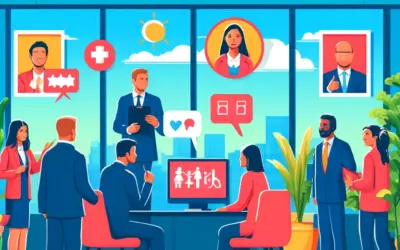The Advent of Automated Resume Screening
The world of talent acquisition is transforming with the advent of artificial intelligence (AI). One facet of modern recruitment revolutionized by AI is resume screening. Previously, recruiters spent countless hours manually reviewing applications, a process prone to oversight and bias. Now, AI-driven algorithms can swiftly evaluate thousands of resumes, targeting specific keywords and qualifications. This not only increases efficiency but also enhances the ability to identify promising candidates among what might seem like a deluge of prospects. Furthermore, AI tools can learn and adapt over time, continuously refining their selection criteria based on successful hires.
Revolutionizing Candidate Assessment
Another significant area where AI impacts recruitment is in candidate evaluation. Traditional methods involve face-to-face interviews, which cannot always objectively assess a candidate’s skills. AI-powered assessment tools introduce innovative approaches, such as gamified testing, that provide more data points on a candidate’s abilities and potential fit. These tools can measure cognitive abilities, emotional intelligence, and problem-solving skills in a standardized way, ensuring a level playing field for all applicants. Such assessments are particularly useful for roles where technical skills are paramount and can predict job performance more accurately than the traditional interview process.
Enhanced Recruitment Experience with AI Chatbots
Recruitment isn’t solely about finding the right talent; it’s also about providing a smooth and engaging experience for candidates. AI chatbots have transformed the initial interaction applicants have with a company. They can answer frequently asked questions, assist with the application process, and provide real-time updates about the recruitment status. This immediate engagement keeps candidates informed and interested, showcasing the employer’s commitment to innovation and communication. Moreover, AI chatbots gather useful data throughout these interactions, offering insights for recruiters to further optimize the hiring process.
Implications for Diversity and Inclusion
As AI influences recruitment practices, there’s significant potential to enhance workplace diversity and inclusion. AI-driven algorithms can be designed to ignore demographic information, such as age, gender, and ethnic background, focusing purely on the qualifications relevant to the job. This unbiased screening paves the way for a more diverse pool of candidates. However, it’s crucial to note that AI systems are only as unbiased as the data they’re trained on. Therefore, continuous monitoring and updating of AI tools are essential to prevent replicating existing biases and ensuring a truly equitable recruitment process.
The Emergence of Virtual Reality in Recruitment Simulations
The integration of Virtual Reality (VR) into the recruitment process marks a significant evolution in how companies assess and engage with potential candidates. The traditional methods of evaluating job applicants through resumes, interviews, and written tests are now being supplemented, and in some cases replaced, by immersive VR simulations. These simulations offer a more dynamic and interactive evaluation of an applicant’s skills and suitability for a role.
Transforming Candidate Assessment
Recruitment simulations via VR create a controlled environment where candidates can demonstrate their abilities in real time. This hands-on approach enables recruiters to gain insight into a candidate’s problem-solving and decision-making skills, beyond what can be discerned from a resume or during an interview. VR simulations are especially beneficial for roles that involve a high level of interpersonal interaction or require specific technical skills.
- Increased accuracy in gauging an applicant’s practical abilities
- Improved assessment of soft skills, such as communication and teamwork
- Standardized testing environments, reducing the influence of interviewer bias
Enhancing Candidate Experience
Beyond its assessment capabilities, Virtual Reality also plays a crucial role in improving the candidate experience. By offering a hands-on, engaging interaction during the recruitment phase, candidates get a taste of what their future job could entail. This immersive experience not only makes the recruitment process more memorable, but it also provides a deeper connection between the candidate and the potential employer.
- Interactive and engaging application processes
- A unique peek into the company culture and work environment
- Memorable experiences that differentiate the employer’s brand
Virtual Reality’s Role in Remote Recruitment
With an increasing number of businesses supporting remote work, Virtual Reality also offers solutions for recruiting talent globally without geographical constraints. VR can simulate the workspace and collaborative opportunities for candidates, allowing them to virtually step into their potential workplace from any location. This setup is not only cost-effective for the company but also opens doors to a wider talent pool.
- Cost-effective global talent acquisition
- Accessibility for candidates independent of their location
- Seamless integration with existing remote working structures
Big Data Analytics: Transforming Recruitment into a Science
Understanding the Power of Big Data in Talent Acquisition
In the swiftly evolving job market, big data analytics is revolutionizing the way companies approach talent acquisition. The immense volumes of data now available can inform and streamline the recruitment process, transforming it from an art to a more precise science. Employers can analyze a broad spectrum of information, from resumes and social media activity to interaction patterns and employee performance metrics, gaining invaluable insights to make evidence-based hiring decisions.
Navigating Through the Data Deluge
Big data offers an unprecedented ability to sift through vast oceans of information. With the right analytical tools, recruiters can identify patterns and correlations that would otherwise go unnoticed. However, leveraging big data effectively requires the ability to distill the data into actionable insights. This means focusing on relevant metrics, such as candidate engagement rates and the success of past recruitment campaigns, rather than getting lost in extraneous details.
The Role of Predictive Analytics in Shaping Recruitment Strategies
Predictive analytics stands as a cornerstone of modern recruitment, enabling employers to make proactive talent searches based on forecasting models. By evaluating historical data, companies can predict future job performance and retention, helping them identify the best candidates. These predictions are not mere guesswork but are built on sophisticated algorithms that assess hundreds of variables to determine the likelihood of a candidate’s success in a particular role.
Developing Data-Driven Recruitment Policies
Through the application of big data analytics, organizations can refine their recruitment strategies, optimizing job postings, interview processes, and onboarding procedures. For example, analyzing data from past hiring cycles may reveal the most effective job boards or the optimal time to post new openings. As a result, companies are not only able to improve their hit ratio in hiring but can also significantly reduce time-to-hire and cost-per-hire.
Enhancing Candidate Experience with Machine Learning
Machine learning, an offshoot of big data analytics, is playing an increasingly prominent role in customizing the candidate experience. By employing algorithms that adapt over time, recruiters can provide applicants with personalized job recommendations and communication tailored to their preferences and behavior. This not only improves the candidate journey but also increases the chance of attracting top talent by presenting opportunities that closely align with their career aspirations.
Ensuring Bias-Free Recruitment Practices
Another benefit of incorporating big data into recruitment is the potential to reduce unconscious bias. By relying on data-driven insights, decisions are made on the basis of objective criteria rather than subjective judgments. Additionally, machine learning tools can be programmed to overlook demographic information that could lead to biased decision-making, fostering a more diverse and inclusive workforce.
As organizations harness the power of big data analytics, recruitment is undergoing a profound transformation. Now more than ever, data is at the core of connecting employers with the right candidates, ensuring that companies are not only staffed with competent employees but also with individuals who will drive innovation and contribute to a thriving corporate culture.
Mobile-First Strategies in Recruitment
Understanding the Importance of Mobile-First Design in Recruitment
The rise of smartphones has fundamentally transformed the way job seekers search for opportunities. In response, recruiters have begun to prioritize mobile-first strategies to enhance the candidate experience. Crafting a mobile-friendly recruitment process is no longer a luxury but a necessity. This shift towards a mobile-centric approach ensures that career websites and application processes are easily accessible on small screens, thereby widening the pool of potential applicants and streamlining the path to application.
Responsiveness and Speed: Keys to Mobile Optimization
Employers must ensure their online resources are fully responsive. This means websites should automatically adjust to fit the screen size of any device, maintaining functionality and aesthetics. Moreover, speed is of the essence. A slow-loading page can deter job seekers, leading to higher bounce rates and lost opportunities. Accelerated Mobile Pages (AMP) and streamlined design elements contribute to a faster, more pleasant user experience.
Leveraging Social Media and Messaging Platforms in Recruitment
Social media platforms have become integral to a successful recruitment strategy. The mobile-first approach involves utilizing these platforms’ expansive reach and targeting capabilities. Recruiters are increasingly embracing the power of social networks such as LinkedIn, Twitter, and Facebook to find and engage with prospects. In addition to traditional postings, savvy recruiters are harnessing the interactivity of these platforms, using direct messaging and social media advertisements to attract candidates.
Integrating Messaging Apps for Instant Communication
- Candidate Engagement: Utilizing apps like WhatsApp and Facebook Messenger facilitates instant and personable communication with candidates.
- Scheduling Interviews: Chatbots and messaging platforms can streamline the scheduling process by integrating with calendar services.
- Real-Time Updates: Keeping candidates informed with timely notifications about their application status through direct messaging can enhance the candidate experience.
Adapting the Application Process for Mobile Users
To reduce the friction in the application process, recruiters must simplify application forms and optimize them for mobile use. A mobile-first strategy in recruitment focuses on minimizing lengthy forms and complex instructions, which can be deterrents for prospective applicants on mobile devices. Instead, recruiters are adopting more concise formats, offering easy-upload options for resumes, and enabling auto-fill capabilities that integrate with information from professional networking sites.
Utilizing Mobile-First Features to Streamline Applications
Recruiters can implement mobile-first features to enhance the application experience:
- One-Touch Apply: Enable applicants to submit their details with a single tap using pre-populated information from their online profiles.
- Mobile Resume Builder: Offer tools that allow candidates to create or update their resumes directly on their mobile devices.
- Voice Input: Incorporate voice-to-text capabilities to facilitate form filling and reduce the tedium of typing on a small screen.
Measuring the Success of Mobile Recruitment Efforts
Implementing a mobile-first strategy is just the beginning; measuring its effectiveness is crucial to continual improvement. Key performance indicators (KPIs) such as mobile application rates, time spent on site via mobile, and mobile conversion rates give valuable insights into user behavior and preferences. Equipped with this data, recruiters can refine their strategies, ensuring that their mobile-first approach aligns with the evolving needs of the job market and remains competitive in attracting top talent.
Blockchain Technology: Enhancing Security and Trust in Recruitment
In the current digital era, the recruitment industry has been revolutionized with the integration of blockchain technology. Organizations across the globe are leveraging this robust and secure system to streamline their hiring processes. Blockchain’s inherent features of decentralization, transparency, and immutability foster greater trust and security, which are crucial aspects in recruitment.
The Fundamentals of Blockchain in Recruitment
Blockchain technology serves as a decentralized ledger that records all transactions across a network of computers. In the context of recruitment, it offers a secure way to manage and share educational qualifications, work history, and professional certifications. It assures the authenticity of the candidate’s information, as once data is entered into the blockchain, it is nearly impossible to alter.
Increasing Trust in Candidate Credentials
Credentials are central to the recruitment process. Employers often face challenges with the verification of academic and professional qualifications. Blockchain can irrefutably verify the legitimacy of a candidate’s credentials, thereby reducing the risk of fraudulent claims.
- Secure Credential Storage: Candidates can store their credentials on a blockchain, ensuring that they are tamper-proof.
- Instant Verification: Employers can instantly verify the credentials without intermediaries, which accelerates the hiring process.
- Global Acceptance: A blockchain-based system is universally accessible and recognized, making it easier for multinational companies to hire foreign talent.
Streamlining the Recruitment Process
Blockchain technology has streamlined the recruitment process by automating and securing various steps. Smart contracts, which are self-executing contracts with the terms of the agreement written into code, can automatically validate the qualifications of candidates and match them with job requirements. This automation saves significant time and resources for both recruiters and candidates.
- Reduction in Paperwork: With blockchain, the need for extensive paperwork is reduced as data is digitized and securely stored on the blockchain.
- Enhancing Candidate Experience: The efficiency of blockchain recruitment systems offers a smoother experience for candidates, as they can easily upload and share their credentials with potential employers.
- Eliminating Bias: Blockchain can also help in eliminating unconscious bias by providing only the necessary information for job matching, ensuring a fair recruitment process.
Guaranteeing Data Privacy
Privacy concerns are paramount when dealing with personal data. Blockchain technology enables candidates to have control over their data, deciding who can access their personal information.
- Permission-based Access: Candidates grant permission to employers to access their data, retaining autonomy over their information.
- Data Encryption: Blockchain ensures that data is encrypted and secure, preventing unauthorized access to sensitive information.
- Compliance with Regulations: By using blockchain, organizations can adhere to stringent data protection laws such as the GDPR (General Data Protection Regulation), thus maintaining candidates’ privacy rights.
The Future Impact on the Recruitment Industry
The incorporation of blockchain technology in recruitment is still in its early stages, but its potential impact is significant. It promises a future where hiring processes are more secure, transparent, and efficient. As the technology matures, we can expect blockchain to become a standard in human resources practices, redefining how trust and security are established in professional environments.













0 comentarios